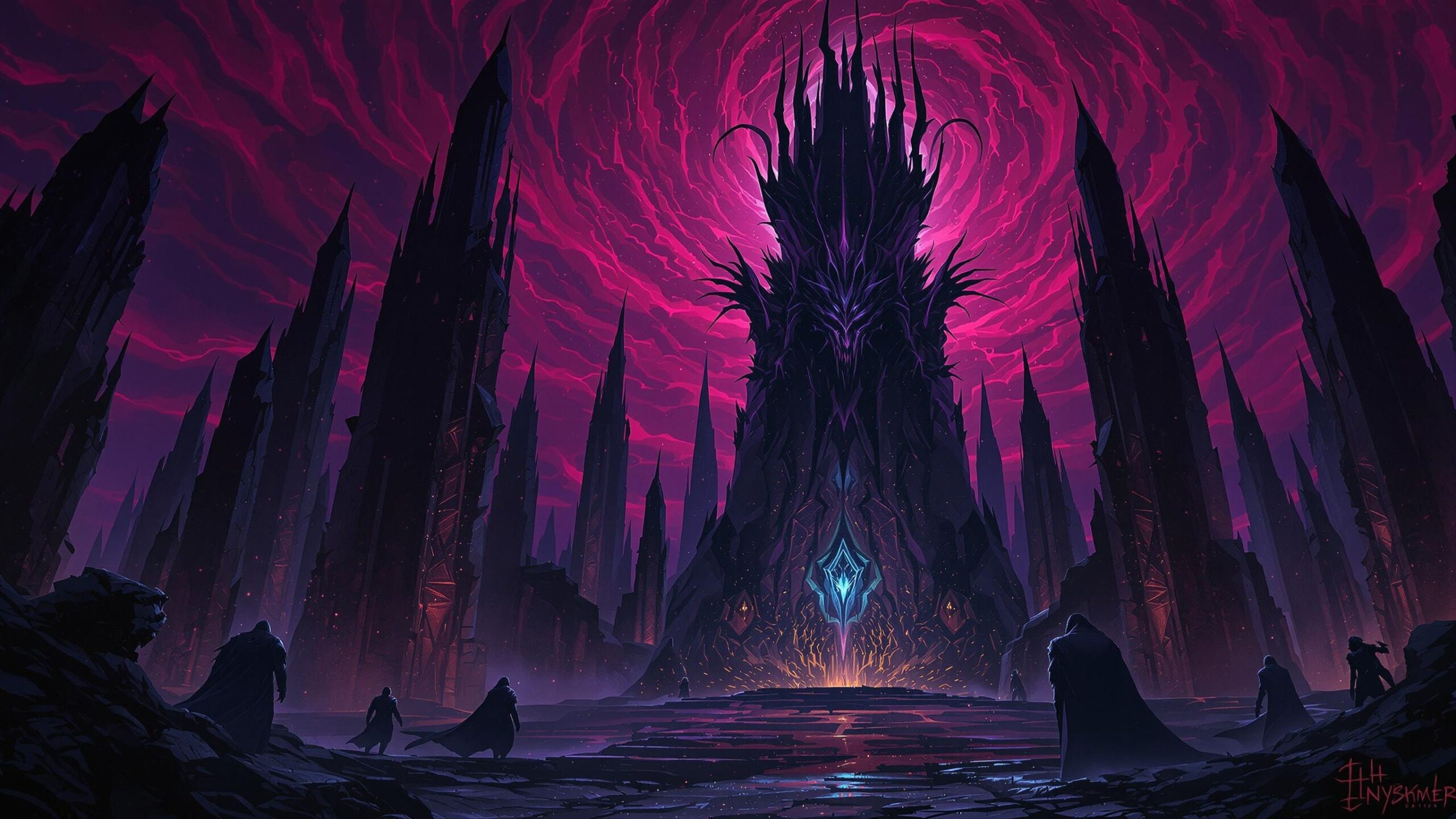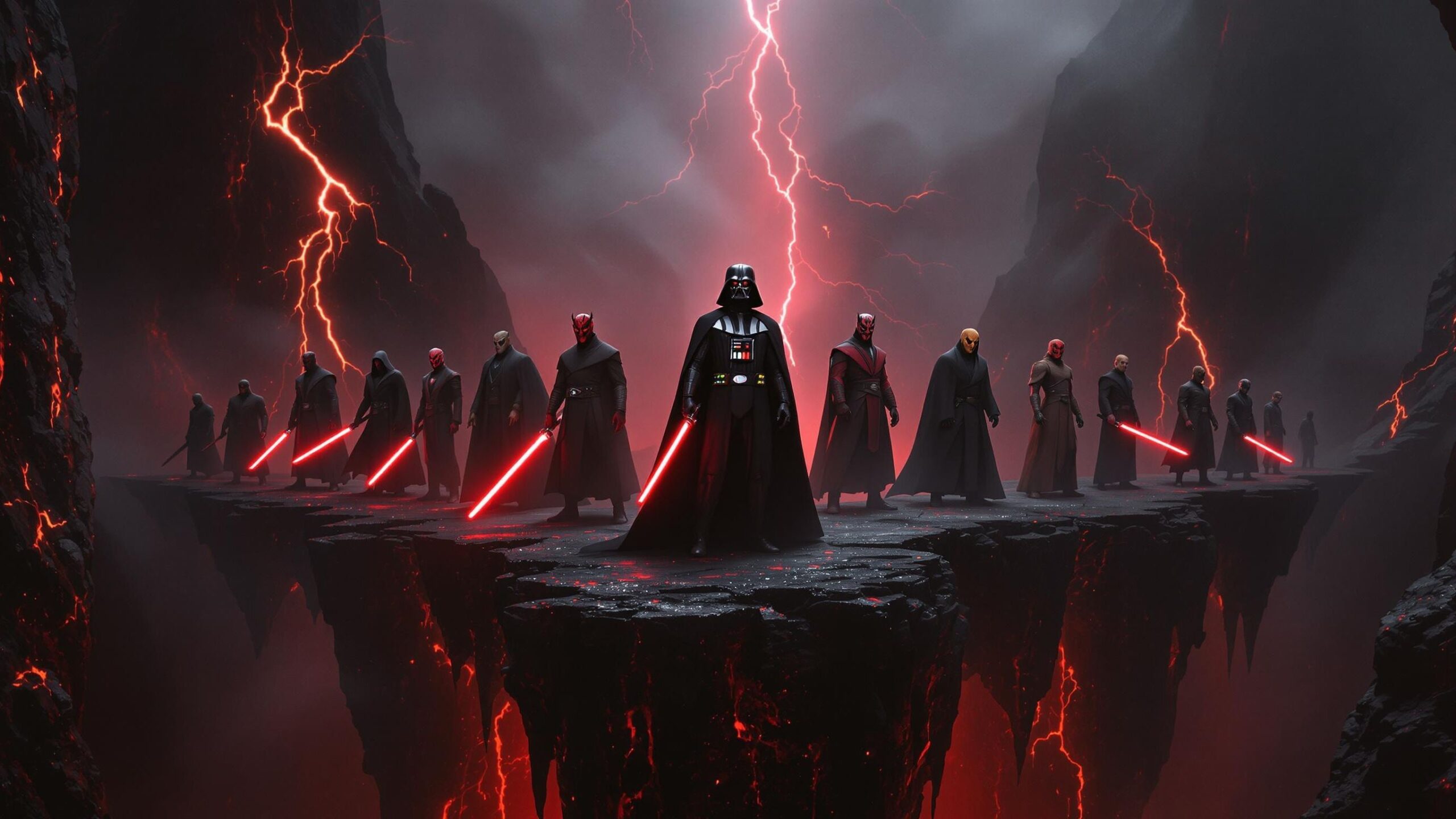The world of The Elder Scrolls is shaped as much by unseen forces as it is by mortal hands. Beyond the mortal plane lies Oblivion, and within it, the Daedric Princes—beings of unimaginable power, cruelty, and cunning. Though not truly gods, these Princes wield enough influence to reshape history, devastate kingdoms, and shatter the minds of entire civilizations. Some offer mortals forbidden gifts. Others offer only annihilation. Here is the ten Daedric Princes whose danger transcends legend—entities so potent that even mentioning their names in some corners of Tamriel is considered an act of pure madness.
#10: Clavicus Vile – The Trickster of Bargains
Clavicus Vile, often appearing as a jovial, well-dressed nobleman (frequently accompanied by his sarcastic talking dog Barbas), embodies one of the most dangerous concepts in existence: the Faustian bargain. On the surface, Clavicus seems almost helpful. He grants wishes, fulfills desires, and offers solutions to mortal problems. Need power? Wealth? Revenge? He’ll grant it in a heartbeat—but always with a catch. His gifts twist into curses, his blessings into burdens. Those who bargain with him often find themselves ruined by the very things they sought.
One of the most chilling examples of Clavicus’ manipulation is the creation of powerful artifacts like the Masque of Clavicus Vile, said to grant the wearer uncanny charisma and success—only to bring inevitable betrayal and downfall. Legends say that entire kingdoms have fallen because a ruler once accepted a whisper from Clavicus and sealed their fate unknowingly.
In The Elder Scrolls IV: Oblivion, players meet followers of Vile whose lives have been utterly shattered by their deals. In Skyrim, the Daedric quest “A Daedra’s Best Friend” showcases Clavicus’ flippancy with mortal lives, even as he toys with powerful magical artifacts.
Lore reveals that Clavicus represents a larger truth about Oblivion’s Princes: power without wisdom is a trap. His cheerful façade hides a cold, calculating manipulator who delights in mortal hubris. Behind the scenes, Elder Scrolls writers have confirmed that Clavicus Vile is meant to echo classic mythological trickster deities—charming, funny, and absolutely deadly.
Ultimately, Clavicus is dangerous because he doesn’t need to conquer. He simply lets mortals destroy themselves. His greatest weapon isn’t a sword or spell—it’s temptation. And no hero, king, or mage is entirely immune to a whisper that says, “I can give you everything you ever wanted…for a price.”
#9: Peryite – The Taskmaster of Plague
Peryite, known infamously as “The Taskmaster,” governs two chilling domains: Pestilence and Order. At first, it seems like a strange pairing—how can disease and strict structure coexist? But Peryite’s true horror lies exactly there: using sickness as a tool to enforce a brutal, natural balance.
While other Daedric Princes thrive on grand acts of violence or deception, Peryite operates with terrifying subtlety. His influence seeps into mortal worlds slowly, spreading like a virus, unnoticed until it’s too late. Where there is overcrowding, political unrest, or rampant growth, Peryite sends plagues—not out of malice, but because “balance must be restored.” In his view, disease is not cruelty. It’s correction.
In Oblivion, players encounter Peryite’s worshippers during the “The Only Cure” quest, where cultists willingly subject themselves to horrific disease, believing that suffering purifies the soul and fulfills their Prince’s will. Even the champion tasked with investigating the cult finds the aftermath grim—bodies frozen mid-suffering, minds lost to Peryite’s dark blessing.
His influence isn’t limited to isolated incidents. In deeper lore, it’s whispered that ancient plagues across Tamriel—some so devastating they shifted entire political landscapes—can be traced back to Peryite’s silent hand.
Designers of the Elder Scrolls games have described Peryite as “the most terrifying precisely because no one notices him until the world is already dying.” He doesn’t need to conquer. He just needs to wait. His patience is endless, his touch invisible—and his victory, inevitable.
What makes Peryite especially chilling is the morality behind his actions. In his own mind, Peryite is not evil—he is necessary. In a world where unchecked ambition leads to ruin, disease is merely a harsh form of mercy. Facing Peryite isn’t about resisting evil. It’s about resisting the indifferent cruelty of a universe that corrects itself without kindness.
#8: Vaermina – Mistress of Nightmares
Vaermina, the Daedric Prince of Dreams and Nightmares, strikes fear into even the bravest hearts—and for good reason. While most Daedra attack bodies, Vaermina attacks the mind itself, eroding sanity until nothing remains but terror.
Her influence is often insidious, seeping into the subconscious and planting seeds of madness. Entire cities have fallen because Vaermina infected them with sleeplessness, causing rulers to turn paranoid, friends to betray friends, and populations to self-destruct from within.
The most infamous example is the town of Dawnstar in Skyrim. In the quest “Waking Nightmare,” players discover that the entire city has been suffering from horrific, endless nightmares caused by a Vaermina artifact—the Skull of Corruption. Left unchecked, this nightmare plague would have likely driven the entire city into mass insanity.
Lore delves even darker. Vaermina’s dream-realm, Quagmire, constantly shifts and reshapes itself, reflecting the most terrible fears of any soul trapped within. Mortals caught in Quagmire may believe they’re enduring centuries of torture—only to realize mere minutes have passed. Some never escape, living and dying within endless bad dreams.
According to Elder Scrolls writers, Vaermina was crafted to embody “existential horror”—the fear of losing control over one’s own mind, memories, and identity. Her artifacts (like the Skull of Corruption) are dangerous not because they kill directly, but because they break trust and shatter reality.
Vaermina’s true danger lies not just in destroying the body or mind—but in making you believe you were never whole to begin with.
#7: Hermaeus Mora – The Demon of Knowledge
Hermaeus Mora, the Daedric Prince of Knowledge and Memory, is one of the most disturbing forces in all Elder Scrolls lore. At first glance, he appears more curious than malicious—an ancient mass of writhing tentacles and endless eyes, lurking in his realm of Apocrypha. But make no mistake: knowledge itself is his weapon, and his hunger for it is utterly limitless.
Hermaeus Mora is dangerous not because he wages wars or spreads plagues, but because he offers truths that mortals were never meant to know. His gifts are forbidden knowledge—spells that warp reality, secrets that unmake sanity, and revelations that can topple empires. Once a mortal accepts his knowledge, they are bound to him forever, their fates twisted into tangled, tentacled threads in his grasp.
In The Elder Scrolls V: Dragonborn DLC, players encounter Mora firsthand, and it’s chilling. Miraak, the first Dragonborn, fell to Mora’s influence, abandoning loyalty to gods and mortals alike in exchange for forbidden power. Miraak’s corruption wasn’t forced—it was an inevitable consequence of mortal curiosity, and Mora was there, waiting patiently, knowing mortals could never resist the call of secrets too vast to comprehend.
Lore states that entire civilizations, such as the ancient Atmorans and Dwemer, fell partly because of knowledge tied to Mora’s influence. His domain, Apocrypha, is a library of infinite knowledge—but it is also a prison, trapping those who delve too greedily into its black pages.
Developers designed Mora to represent “the paradox of knowledge”: enlightenment and annihilation wrapped into one. Seeking power from him feels thrilling but always comes with a cost—a slow erosion of free will replaced by a gnawing need to know more, more, more.
Hermaeus Mora’s danger is timeless: he doesn’t conquer with armies, but by weaponizing mortal curiosity until the soul itself is devoured.
#6: Boethiah – The Prince of Plots
Boethiah, the Daedric Prince of Deceit, Conspiracy, and Treachery, is terrifying not because of sheer magical might—but because she makes betrayal a religion.
Worshiped by assassins, rebels, and rulers alike, Boethiah encourages mortal followers to betray, kill, and overthrow those they serve. Her very philosophy is built around the idea that only through struggle and backstabbing can true power be achieved. In her eyes, loyalty is weakness; betrayal is evolution.
In Skyrim, Boethiah’s Calling quest perfectly encapsulates her brutality. Players are summoned to her shrine only to be told to betray and sacrifice a follower in cold blood just to earn her favor. This isn’t optional; Boethiah demands proof that you value ambition over sentiment, cruelty over kindness.
Throughout Elder Scrolls history, Boethiah has played a direct role in shaping major events. She was instrumental in teaching the Chimer (ancestors of the Dunmer) to reject the worship of the Aedra and embrace change through conflict. This single act altered the racial, political, and religious history of Tamriel forever.
Lore paints Boethiah not merely as a distant manipulator, but as a Prince who takes personal pleasure in watching kingdoms fall, heroes betray their comrades, and civilizations tear themselves apart from within.
Elder Scrolls writers confirmed Boethiah was crafted to embody “the cruel lesson that ambition always carries a knife.” Every deal she offers, every tournament she holds, is a test where only the most ruthless survive—and that makes her one of the most existentially dangerous beings in the series.
Boethiah’s realm, the Realm of Attribution, is a twisted reflection of endless arenas, where betrayal isn’t an act of villainy—it’s the highest virtue.
#5: Mehrunes Dagon – The Prince of Destruction
When you think of catastrophic power in Elder Scrolls, Mehrunes Dagon immediately comes to mind.
He is the Daedric Prince of Destruction, Change, Revolution, Energy, and Ambition—and he doesn’t deal in subtlety. Dagon’s influence means ruin. Cities topple. Landscapes burn. Realities crack under his wrath.
In The Elder Scrolls IV: Oblivion, Dagon is the primary antagonist, leading the Oblivion Crisis in a direct, brutal assault on Tamriel. His Daedric armies poured through Oblivion Gates, laying waste to cities like Kvatch, murdering thousands, and bringing Tamriel to the brink of annihilation. Had it not been for the sacrifice of Martin Septim and the intervention of Akatosh’s avatar, Dagon might have conquered the mortal world entirely.
Lore hints that Dagon has attempted similar world-ending invasions multiple times, only to be barely thwarted by the Aedra and mortals working in desperate unity. His hatred for mortal structures—kings, laws, civilizations—is absolute.
Unlike many Princes who offer bargains, knowledge, or corruption, Dagon simply seeks destruction for its own sake. His world view is a brutal Darwinian hellscape: only through endless destruction can anything worthwhile emerge.
Developers said that Dagon’s philosophy of “creative destruction” was central to his character: he doesn’t believe he’s evil. He believes he’s necessary. In his mind, peace breeds weakness. Only fire forges strength.
Facing Dagon isn’t just a matter of courage—it’s about enduring a storm of annihilation that doesn’t care whether you are strong, weak, good, or evil. It simply destroys—and then moves on.
#4: Molag Bal – The King of Domination
Molag Bal isn’t just a Daedric Prince—he’s a nightmare given form.
Known as the Prince of Domination and Enslavement, Molag Bal’s entire existence revolves around cruelty, submission, and the complete stripping away of freedom. If Mehrunes Dagon represents destruction, Molag Bal represents eternal suffering—a world conquered, broken, and shackled forever under his iron rule.
Lore across The Elder Scrolls is filled with Molag Bal’s atrocities. He is the father of vampires, having twisted blood and life into weapons of endless corruption. In The Elder Scrolls Online, players witness firsthand the horrors of his attempted “Planemeld,” a plot to drag Nirn into his personal plane of Coldharbour—a nightmarish realm of enslaved souls and ruined, frozen landscapes.
Coldharbour itself is a terrifying reflection of Nirn, showing how Molag Bal envisions a conquered world: familiar, but drained of col or, life, and hope. Every building is a ruin, every soul a chained slave. Mortals are used as raw materials for experiments, tortured endlessly not for information—but for fun.
In gameplay, quests involving Molag Bal always feel heavier and darker. Whether it’s battling vampires, encountering cursed artifacts like the Mace of Molag Bal, or resisting his psychic manipulations, players are reminded that some evils don’t seek power—they seek domination for its own sake.
Developers have repeatedly described Molag Bal as one of the “purest villains” in Elder Scrolls lore—one who doesn’t pretend to offer enlightenment, pleasure, or freedom. He only offers chains.
Molag Bal’s danger is absolute: where he walks, hope dies. His vision of reality isn’t a battlefield. It’s a graveyard where free will itself has been murdered.
#3: Mephala – The Webspinner
Mephala, known as the Webspinner, is the Daedric Prince of Lies, Secrets, and Murder—and no one in the Elder Scrolls universe wields influence as dangerously or silently as she does.
Where Molag Bal dominates through raw force and Mehrunes Dagon destroys with fire, Mephala whispers and watches as others destroy themselves. Her greatest victories are wars started by rumor, empires toppled by secret betrayal, and bloodlines ended not by sword, but by whispered deceit.
Lore states that Mephala was instrumental in guiding the early Chimer, teaching them the art of assassination, subterfuge, and political intrigue. While Boethiah gave them rebellion, Mephala taught them how to survive rebellion through manipulation. Without her, the Dunmer might never have become the hardened, secretive people they are today.
In gameplay, Mephala’s artifacts reflect her philosophy. The Ebony Blade, for example, grows stronger with each betrayal—forcing players to kill friends and allies to unlock its true power. Every time players use her gifts; they must embrace treachery.
Mephala’s realm of Oblivion is a vast, shifting spiderweb of realities—every strand a life, every intersection a secret. Few mortals ever see her directly. Most don’t even know they’re serving her until their actions, manipulated through unseen forces, achieve her hidden goals.
Developers often refer to Mephala as the “quiet apocalypse”—the idea that wars end kingdoms loudly, but secrets end entire worlds without anyone noticing.
Mephala is the ultimate reminder that words, whispers, and shadows are more dangerous than any sword.
#2: Sheogorath – The Mad God
Sheogorath, the Daedric Prince of Madness, is often portrayed as a jester—silly, strange, and even endearing. But to think Sheogorath is harmless is the greatest mistake you can make.
He embodies all madness: the laughter of joy, yes, but also the howling insanity of despair. His realm, the Shivering Isles, reflects the two sides of madness—split between the manic Mania and the depressive Dementia. Here, reality bends, logic dissolves, and even the strongest minds can break in days.
In The Elder Scrolls IV: Shivering Isles expansion, players serve Sheogorath, watching as he effortlessly manipulates kings, ruins armies, and alters the world’s very fabric with a word or a whim. Mortals are toys to him, cities experiments, and sanity just an easily shattered illusion.
Lore suggests that Sheogorath may actually be the transformed remnants of Jyggalag, the Daedric Prince of Order—cursed to become the embodiment of chaos as punishment for his threat to the other Princes. This duality—order locked inside madness—makes Sheogorath’s power even more terrifying.
Behind the jokes and cheese-based pranks lies an entity capable of rewriting the rules of existence at a whim, turning peace into slaughter, hope into despair, reality into nightmare.
Developers said they designed Sheogorath to show “the thin line between laughter and terror,” and players who spend enough time in his world realize just how thin that line truly is.
Sheogorath’s true danger is absolute: there is no logic that can stop him—because madness follows no rules.
#1: Molag Bal – The King of Domination
Molag Bal is not merely a Daedric Prince. He is the ultimate nightmare—the purest embodiment of domination, cruelty, and the total annihilation of freedom. Where other Princes tempt, deceive, or destroy, Molag Bal enslaves. His ambition is horrifyingly simple: to chain every soul, to drag Nirn into his hellish realm of Coldharbour, and to rule forever over a world stripped of will and hope.
Throughout The Elder Scrolls lore, Molag Bal’s atrocities are legendary. He fathered the first vampires, turning life itself into a parasitic weapon. In The Elder Scrolls Online, his Planemeld sought to merge Nirn with Coldharbour, transforming the world into a broken, colorless reflection of itself. In Coldharbour, the rivers are toxic, the skies are gray, and every building stands as a monument to suffering. Mortals are not merely killed—they are twisted, tortured, and reshaped into eternal slaves; their identities shredded beyond recognition.
Molag Bal’s artifacts, such as the Mace of Molag Bal, are instruments of domination rather than destruction, designed to steal the very essence of the soul. His influence corrupts mortals, driving them not just to cruelty, but to a perverse desire to dominate others in turn. Behind every tyrant who revels in the suffering of the weak, Molag Bal’s shadow looms.
Developers describe him as the purest villain in the Elder Scrolls universe: a being who offers no lies, no temptation—only brutal submission. In facing Molag Bal, mortals are not just battling for survival. They are fighting for the very right to choose, to think, to be.
In a universe filled with nightmares, Molag Bal stands alone as the prince who doesn’t seek to kill you—he seeks to own you, forever.
The Daedric Princes are not mere villains. They are forces of nature, ideas given will, ancient and alien beings who play with mortals for amusement, curiosity, or contempt. Facing a Daedric Prince isn’t about winning—it’s about surviving a force that existed before your world began and will exist long after it ends.
In the Elder Scrolls universe, power doesn’t just come from steel or spells—it comes from knowing which whispers to ignore, which bargains to refuse, and which nightmares to wake up from before it’s too late.



